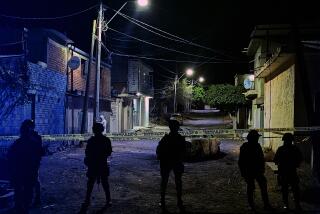Tempers Rise in Afghanistan Before Vote
President Hamid Karzai spurned one of Afghanistan’s most powerful warlords Monday, refusing to accept Defense Minister Mohammed Qassim Fahim as one of his two vice presidential running mates in fall elections.
The decision increased tensions between Karzai and Fahim, but the warlord will remain in his post as defense minister, said a senior general in Fahim’s Northern Alliance militia force. The general spoke on condition that he not be identified because of the sensitive nature of the political dispute.
Fahim was a key U.S. ally in the 2001 war to topple the Taliban regime and can call on about 50,000 militia fighters, as well as units in the Afghan national army who remain loyal to him. He had expected that the military muscle would assure him a place on Karzai’s ticket in the October elections.
But with Washington’s support, Karzai, the interim president, is trying to sideline old-guard militia leaders such as Fahim, who has resisted pressure to disarm his fighters, end their intimidation of voters and make way for a unified national army.
Karzai confirmed Monday that he would run for president, and he announced that Ahmed Zia Masoud, the brother of assassinated Northern Alliance commander Ahmed Shah Masoud, would seek election as the first of two vice presidents.
Ahmed Zia Masoud is a Tajik from northern Afghanistan, and Karzai is a member of the Pushtuns, Afghanistan’s largest ethnic group.
Suspected Al Qaeda suicide bombers killed Ahmed Shah Masoud, a legendary guerrilla veteran of the war against Soviet occupation in the 1980s and later against Taliban rule, two days before the Sept. 11 attacks on the United States.
Karzai invoked Ahmed Shah Masoud’s memory, calling him a “martyr hero,” in announcing that his less well-known brother would be on the presidential ticket.
Karim Khalili, Karzai’s deputy and a commander from the Hazara minority, will run for election as second vice president, Karzai told reporters.
Younis Qanooni, a senior member of Fahim’s Northern Alliance, resigned as Karzai’s education minister Monday to enter the presidential race. Qanooni is a respected politician rather than a warlord and might be able to mount a strong challenge to Karzai, who is considered the front-runner.
“I told him that I didn’t want to accept his resignation, because I wanted him to work for me, but he has decided that he will be a candidate,” Karzai said. “Each and every Afghan has the right to be a candidate, and to vote, and he has used that right, and I wish him all the best in the future.”
At least 20 people, including one woman, have said they will run for president. Election officials will review candidates’ eligibility and announce the final slate of candidates this week.
Abdul Rashid Dostum, an ethnic Uzbek warlord who was another key U.S. ally in the war against the Taliban, announced Friday that he was running for president after resigning as military advisor to Karzai. Dostum’s forces have been accused of committing human rights abuses and war crimes.
As tension between Karzai and Fahim increased over the weekend, a security alert circulated among aid groups and other nongovernmental agencies, or NGOs, in Kabul, the capital, warning staffers to restrict their movements until it was clear whether the dispute would remain nonviolent.
“Marshal Fahim may or may not take serious action ... but if he does, it will likely play itself within the city itself,” the bulletin said. “If serious repercussions appear likely, NGOs should consider remaining in their guesthouses through the early part of this week.”
Concern deepened Sunday as word spread that Fahim did not show up for a Cabinet meeting and instead remained holed up in the Defense Ministry with his chief of staff.
Karzai confirmed Monday that Fahim had not resigned as defense minister. The senior Northern Alliance general who spoke privately said Fahim was angry at being left off the ticket but would not resort to violence.
“Thank God everything will be sorted out through talks,” the general said.
Fahim and his allies have long claimed the right to succeed the Taliban regime, and although his political position is murky, he is likely to continue to challenge Karzai.
Karzai says the militia leaders, most of them veterans of the war against the Soviets, are the biggest threat to Afghanistan’s stability -- not the Taliban fighters waging an insurgency in the south and east.
Afghanistan’s first elections in decades were originally scheduled for June but were postponed until September and then to Oct. 9 as officials grappled with security and logistics problems. Parliamentary elections have been put off until spring.
Watson reported from New Delhi and special correspondent Zaman from Kabul.
More to Read
Start your day right
Sign up for Essential California for news, features and recommendations from the L.A. Times and beyond in your inbox six days a week.
You may occasionally receive promotional content from the Los Angeles Times.






